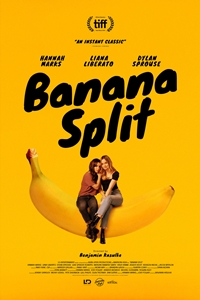Banana Split (R) ★★★
 Banana Split, the directorial debut of cinematographer Benjamin Kasulke, is a romantic comedy with a twist. Here, the central relationship is one of platonic friendship rather than physical attraction. (Although one could make a case that there's more than a hint of sexual tension in the air.) All the romantic comedy tropes are in place but they are applied to the friendship: the "meet cute," the honeymoon stage, the break-up, and the reunion. This offbeat approach brings a freshness to a genre that has become so static and predictable that it has largely fallen out of favor with current movie-goers.
Banana Split, the directorial debut of cinematographer Benjamin Kasulke, is a romantic comedy with a twist. Here, the central relationship is one of platonic friendship rather than physical attraction. (Although one could make a case that there's more than a hint of sexual tension in the air.) All the romantic comedy tropes are in place but they are applied to the friendship: the "meet cute," the honeymoon stage, the break-up, and the reunion. This offbeat approach brings a freshness to a genre that has become so static and predictable that it has largely fallen out of favor with current movie-goers.
The story focuses on a quartet of high school seniors (played by actors who would be more age-appropriate as college grads): April (Hannah Marks), Nick (Dylan Sprouse), Clara (Liana Liberato), and Ben (Luke Spence Roberts). After two years of playing the boyfriend/girlfriend game, Nick and April have come to an uncomfortable end, sparked in part by their decisions to head off to different colleges. Nick puts the final nail in the coffin when he starts dating Clara. The fourth wheel is Ben, who has the unfortunate distinction of being perceived by both women as purely "best friend" material.
For April, the green-eyed monster rears its head when she sees Nick with Clara. When the two women come face-to-face at a party, however, the unexpected happens: they discover they like one another. Over the course of the next several days and weeks, they start to hang out, even coming up with a set of rules to handle the unconventional situation: (1) No talking about Nick, (2) No talking about their situation with Nick, and (3) no social media. They adopt fake names for on-line chatting: April is "Brad Pitt" and Clara is "George Clooney."
Banana Split's structure feels familiar but the critical difference is that, as close as April and Clara become, their interaction remains non-sexual. Others doubt what's going on and there are times when they question it themselves. But both are heterosexual and neither appears interested in exploring. That doesn't stop a deep and abiding relationship from developing. We have seen numerous movies about non-sexual male bonding (although almost all of those invite the use of the term "homoerotic" at some point) but something of this sort is less common with female characters. Meanwhile, Nick is less of a character than an object. Both women lust after him and he becomes more important as a catalyst for how April and Clara relate to one another than as a means of bringing about a satisfying conclusion. If there's one misstep, it's the handling of Ben. The movie seems undecided about how to use the character or what his storyline should be. It's incomplete and the one attempt to do something significant with him doesn't work. He deserves his own movie.
The movie's abiding strength is the chemistry between Hannah Marks (who co-write the screenplay with Joey Power and resembles a younger Aubrey Plaza) and Liana Liberato. The two mimic the interpersonal dynamic that occurs in common romantic comedies but, although they tease with the idea that they may at some point kiss, it never happens. Banana Split is making a point about how love and sex are not necessarily entwined and uses the natural connection between Marks and Liberato to express this. Marks has a long history in front of the camera, having worked in television and indie films since her teens. She also recently began directing; her feature debut was After Everything. Liberato's career has been focused more on film; she has appeared in Novitiate and The Beach House.
Those expecting the relationship between April and Clara to cross a sexual line may be disappointed by where Banana Split takes them. However, both characters are well-developed and their interaction seems genuine, especially when one considers the confines of the genre. The humor avoids becoming too outrageous. This is like an indie version of Olivia Wilde's Booksmart, which was filmed after Banana Split despite being released earlier. Both films offer complex perspectives of high school-oriented female friendships without demanding a happy ending for the happy ending.
© 2020 James Berardinelli
To get the full Quicklook Films experience, uncheck "Enable on this Site" from Adblock Plus
box office top 10

Challengers Released: April 26, 2024 Cast: Zendaya, Josh O'Connor 15M

Unsung Hero Released: April 26, 2024 Cast: Daisy Betts, Joel Smallbone 7.8M

Godzilla x Kong: The New Empire Released: March 29, 2024 Cast: Rebecca Hall, Brian Tyree Henry 7.2M

Civil War Released: April 12, 2024 Cast: Kirsten Dunst, Wagner Moura 7M

Abigail Released: April 19, 2024 Cast: Melissa Barrera, Dan Stevens 5.3M

The Ministry of Ungentlemanly Warfare Released: April 19, 2024 Cast: Henry Cavill, Eiza Gonzalez 3.9M

Kung Fu Panda 4 Released: March 8, 2024 Cast: Jack Black, Viola Davis 3.6M

Ghostbusters: Frozen Empire Released: March 22, 2024 Cast: Paul Rudd, Carrie Coon 3.3M

Dune: Part Two Released: March 1, 2024 Cast: Timothée Chalamet, Rebecca Ferguson 2M

Boy Kills World Released: April 26, 2024 Cast: Bill Skarsgård, Famke Janssen 1.7M






